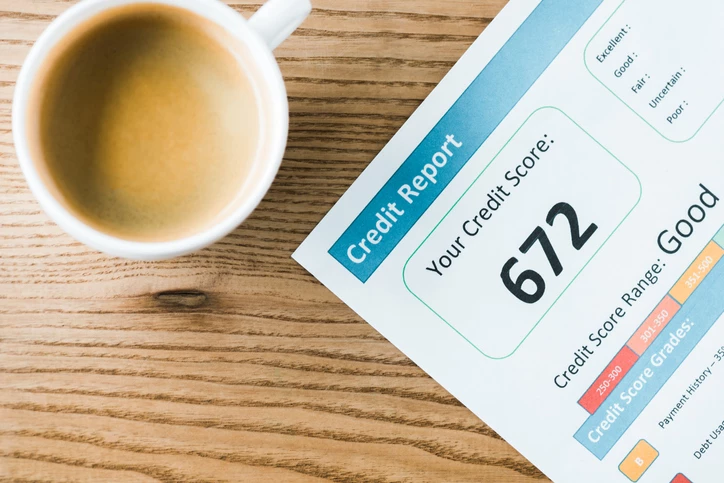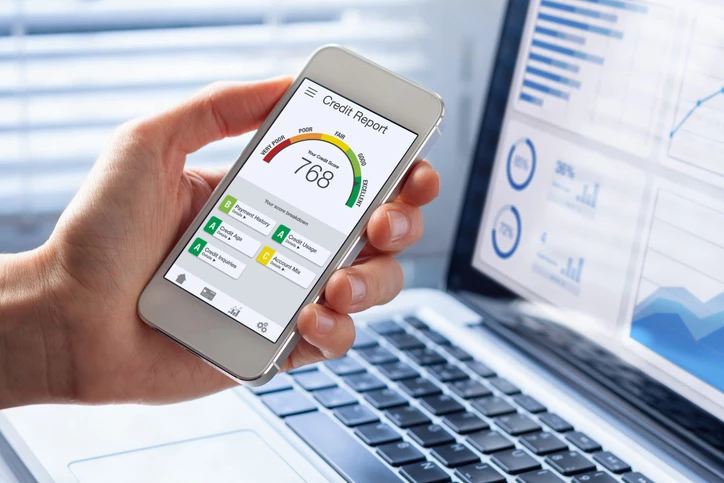12/10/2021 | Category: Home Insurance

When someone offers you or your business credit, they’re taking a risk that you will not repay the money. A credit report is a way of quantifying the risk you represent, allowing lenders to decide whether to lend and how much interest to charge.
What kind of information is used to compile a credit report? How can you find out what your credit rating is? And how can commercial insurance help you in times of financial stress?
Who makes credit reports?
Credit reports are compiled by independent agencies called credit reference agencies (CRAs). In the UK, three CRAs are licensed to provide credit reports: Experian, Equifax and TransUnion. Lenders might check with only one or all three agencies when considering your creditworthiness.
Each of the CRAs operates according to their own rules and may gather information differently or interpret data differently. This means they do not generate identical credit reports. For example, the same rating score number could mean you are low risk with one agency, but high risk with another.

What information goes into credit reports?
CRAs look for information about your financial history and other indicators of whether you are a reliable person. This will include your electoral register information, whether you have County Court Judgments (CCJs) against you, or a history of insolvency.
The CRA will also review the financial accounts you hold with banks including overdrafts and credit card accounts, whether you have a mortgage or other loans including student loans, and records of your payment to companies such as utility providers (electricity, gas, water, phone and internet providers).
Information is drawn from sources such as the electoral roll, court records, banks, and information held by the Council of Mortgage Lenders. A search will also flag up whether you have had other credit checks recently (which could indicate a pattern of running up debt) and whether you have moved frequently or have financial associations with someone with poor credit history, for example your spouse or partner.
Your credit score
Credit reports are used to produce a credit score. Different aspects of your financial history are given a numeric figure and these figures combine to give an overall credit rating.
In order of importance, CRAs consider:
- The amount you owe
- Payment history
- New credit
- Credit history
- Credit mix
For example, Experian would calculate the amount of debt and individual holds, which accounts for 30% of the rating. A history of making regular payments (or missing them) accounts for 35% of the rating, and other factors with credit make up 35% of the rating.
The exact calculations are carried out by computers using complex formulae to combine all the information into a single FICO score of around 300-850. Scores are then used to create bands of credit rating:
- Score of 300-579 - very poor. You may be refused credit or required to pay additional fees or deposits. 16% of people fall into this category.
- Score of 580-669 - fair. This is not an attractive group of borrowers for credit providers, 18% of people fall into this band.
- Score of 670-739 - good. Only a small percentage (8%) of people in this category are likely to be a credit risk. 21% of people fall into this band.
- Score of 740-799 - Very good. People and organisations with this rating are attractive to lenders and may secure good rates - 25% of people fall into this group.
- Score of 800-850 - Exceptional. This group will be offered the best rates from lenders because of the low risk they represent.
How and when should you check your own credit report?
There are two different ways to check a credit report: a hard enquiry and a soft enquiry. A hard enquiry is usually made by someone considering whether to lend you money or trust you to manage funds, for example a lender, creditor, landlord, or employer. This enquiry remains on your credit rating for some time and can impact your credit score in itself, because seeking credit frequently is a sign of risk.
A soft inquiry does not impact your credit rating. It might be you checking your own credit report or it may be carried out as a formality by a provider of credit or insurance.
You can obtain your credit report online through any of the three CRAs (Equifax, TransUnion, Experian) for free. Alternatively, each of the CRAs provide a paid service that offers additional services such as credit monitoring.
For free credit reports, check:
- Money Saving Expert Credit Club for a free Experian credit report.
- Clearscore for Equifax free monthly report.
- Credit Karma for free access to TransUnion credit reports.
If you have never checked your credit rating before or not for a long time, it is recommended to obtain a credit report from all three CRAs. You should then check your credit report regularly – ideally monthly but at least once a year. A regular check can help to flag up an issue so you don’t get any nasty surprises in future when applying for credit or finance.
What do lenders look for in a credit applicant?
It is important to understand that your ability to access credit is not purely about whether you have a history of financial risk taking. It is about the type of customer the credit company wants to attract.
For example, most business owners have a history of borrowing money and there may be times when payments cannot be met or a CCJ is awarded against you. This might not be the only factor that would determine whether a company would be prepared to lend to you, offer commercial insurance or extend any other form of credit.
Credit reports are not a black and white issue. Your score might reduce the range of lenders who would be willing to consider you, or result in them charging you a higher interest rate if you do become a customer. However, it’s too easy to think of credit reports showing if you are good or bad – it’s just not that simple, thankfully.

What improves your credit rating?
If you are unhappy with your individual or business credit rating, there are things you can do to improve it. Credit monitoring services can be invaluable in helping to provide you with tips and pointers on your own credit rating, but here are some additional ideas.
Pay up on time
The most important thing you can do is to prove yourself to be a reliable recipient of credit. This means paying your bills on time, which will boost your credit rating.
Limit your credit applications
Hard enquiries on your record impact your credit rating and might flag you up as someone who is struggling financially. To avoid this, you could go through a broker who will know which lenders are likely to approve you, or ask for a quote before making an official application request for credit.
Check your credit rating regularly
Checking your credit record will help you understand where you stand if you need to apply for credit. If your score starts to drop, you can take action to address the issue.
Watch your personal credit rating as well as your business rating
As a business owner, especially in the early days, your own creditworthiness is as important as your business’. It’s important to ensure your own finances are as healthy as possible to give your business the best chance of success.
Establish a credit history
Having a blank credit history is not an asset. You might see it as demonstrating your creditworthiness, but in the eyes of lenders it means you have not demonstrated that you can be trusted. You can build up a credit record by careful use of loans and credit cards. Factor this into your business plans so you have a credit record by the time you need one.
What worsens your credit rating?
Some of the key factors that limit or affect your credit score are the opposite of those above – so for example, having a history of failing to make payments on time, or having applied for lots of credit in the recent past, will all impact your credit score.
Some negative credit factors that you might not have considered include:
- Marriage
Getting married to someone with a poor credit record won’t immediately impact your own credit rating. However, if you have joint accounts, loans, a mortgage or a credit card with someone who struggles with debt, this could end up impacting your own credit rating.
- Paying the minimum on credit cards
You might not be breaking the rules as far as your responsibilities to a credit card provider, but if you let debt build up by only paying the minimum on a credit card, this could impact your credit rating. Paying only a little more each month could result in a major saving in the long run.
- Not understanding the terms of your credit
It is important to know what you are getting into when you take out a loan or credit card. If you apply for a product, you should understand how the interest and fees work and have a realistic idea of what your business can afford. It’s easy for debts to snowball if your business goes through a bad patch and the fees and interest start to mount, and this can leave a lasting legacy on your credit rating.
- Having a CCJ against you
You should always respond to and engage with a claim made against you, even if you dispute it. Hiding your head in the sand could see things escalate and you could have a court judgment against your name as well as footing the bill for the claimant’s legal costs. Check your commercial insurance to see if you have legal expenses cover as this could help. CCJs will impact your credit rating for six years.
Credit ratings and fraud
Credit ratings can be impacted by criminal activity. Financial fraud often involves impersonation or falsification of documents which may make it look like you are a debt risk.
The national fraud prevention service Cifas can apply a Protective Registration or Victim of Impersonation warning on your credit file to help. This means lenders will carry out additional checks before granting credit, to ensure funding is not released to a fraudster. The downside is that this can make credit approval harder and slower to secure.
Having a Cifas warning on your credit file does not make it impossible to access credit, although you may be required to pass further checks to confirm your identity. The Cifas warning stays on your file for two years.
Bankruptcy and insolvency
Bankruptcy and insolvency are difficult life events to experience and the impact on your credit rating can be a lasting one. However, many business owners experience tough times and it is certainly possible to bounce back from bankruptcy and rebuild your credit rating.
Your bankruptcy is visible to many organisations and third parties who have access to your credit file, such as banks, lenders, utility providers and landlords. It remains on your record for six years or until you are discharged, if this takes longer. You must disclose your bankruptcy status when applying to borrow any sum above £500. It is likely many lenders will refuse to grant credit or will charge very high interest rates.
To rebuild your credit rating, you can take the usual steps including registering on the electoral register, making regular payments and being financially prudent. It is also possible to attach a brief statement to your credit report that explains the reason for your bankruptcy if there are extenuating circumstances, such as redundancy or ill health.
Using credit sensibly, even if it comes with high interest rates, can rebuild your credit rating. For example, a credit card can be used to pay for groceries each month and then repaid in full on time. In time, this may make you eligible for credit with companies with lower interest rates.
Be careful about applying for credit – space out your applications and ensure you are eligible before applying to avoid having a rejection on your account.
Commercial insurance for business owners
One crucial way of protecting your credit rating is to ensure you have good quality commercial insurance to reduce the risk of unexpected financial loss.
Why not get in touch with Insurance Choice today for a commercial insurance quote?
Policy benefits, features and discounts offered may very between insurance schemes or cover selected and are subject to underwriting criteria. Information contained within this article is accurate at the time of publishing but may be subject to change.
